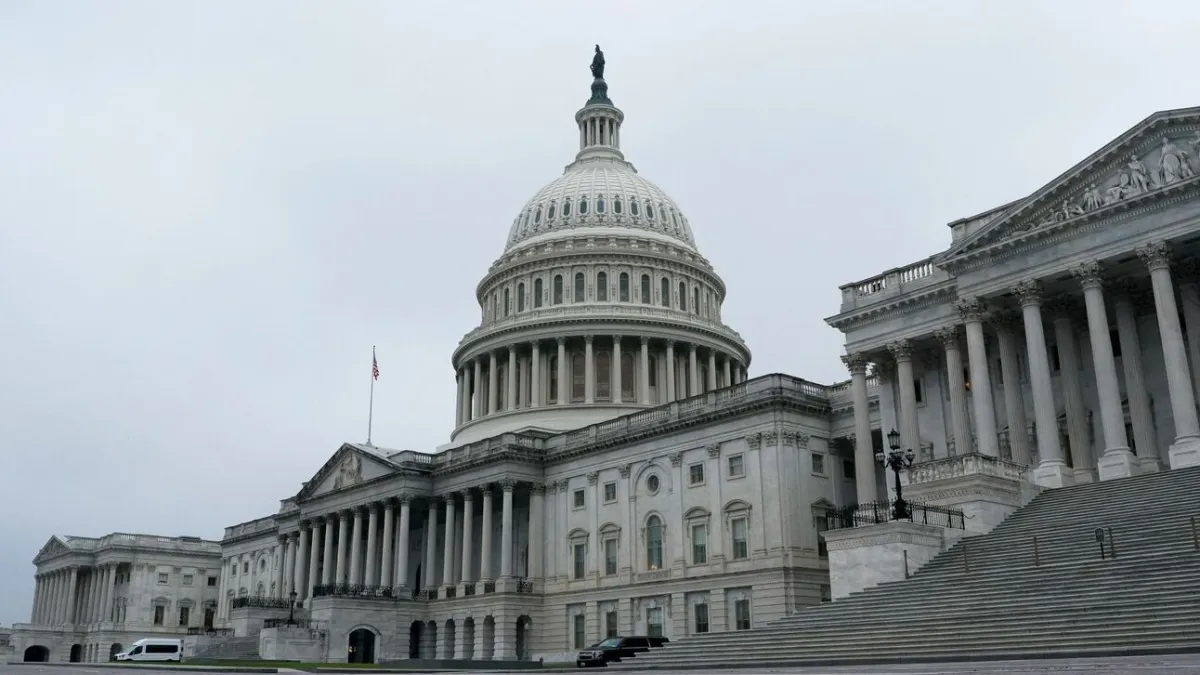
A dark cloud looms on the horizon as Congress prepares for its summer break: There’s a very real chance lawmakers could be inching toward a government shutdown at the beginning of October. This week could go a long way toward determining how likely a shutdown may be.
The slow-moving 2026 annual appropriations process will continue in both the House and Senate this week. Senate Majority Leader John Thune has teed up a test vote on the bill funding military construction and the Department of Veterans Affairs, a measure that cleared the Senate Appropriations Committee in a 26-3 vote and typically draws strong bipartisan backing. But this time might be different.
Democrats are incensed about the way the White House and congressional Republicans have approached the process of funding the government. The Trump administration has repeatedly challenged Congress’s power of the purse and Republicans last week agreed to a White House request to claw back $9 billion in funding that had previously been approved for foreign aid and public media.
“We are going to need to get appropriations done. That will require some cooperation from Democrats, and hopefully they will be willing to make sure that the government is funded,” Thune said on Fox News Channel’s “Sunday Morning Futures.”
Senate Democrats say they have little reason to work with Republicans if the bipartisan spending deals they help reach the necessary 60-vote threshold then get cut via Republican rescission packages that are passed by simple majority votes. On the House side, Republicans have pushed ahead with government funding bills that include spending cuts in line with the president’s budget request and a host of conservative policy riders to boot.
Democrats have little power to push back against GOP spending bills or plans for further rescissions packages. The main point of leverage Democrats can wield is the threat of a shutdown. After House Republicans approved the $9 billion package of cuts last week, House Democratic leaders warned that the GOP was choosing a partisan path that would lead to trouble. “Tonight’s vote, coming hours after the Trump White House abandoned the bipartisan appropriations process, makes it clear that House Republicans are determined to march this country toward a painful government shutdown later this year,” Minority Leader Hakeem Jeffries, Minority Whip Katherine Clark and Democratic Caucus Chair Pete Aguilar said in a joint statement.
Democratic Sen. Chris Murphy of Connecticut, a member of the Appropriations Committee, offered this view of the situation, as quoted by Punchbowl News last week: “They’re putting bills on the floor with the promise that, if we vote for them, they will then put a rescissions bill on the floor to strip out all of our stuff? Why on earth would we agree to that? It’s insane… We’re not patsies. And we shouldn’t act like it.”
Still, it’s not entirely clear that a shutdown would benefit Democrats, as some in the party argued back in March, when Senate Minority Leader Chuck Schumer decided to help pass a Republican spending extension, drawing the ire of many in his party.
“I think the most important thing for us to do is to continue to move the appropriations process as expeditiously as we can, to try and find bipartisan agreement,” Democratic Sen. Jeanne Shaheen, a member of the Appropriations Committee, told Politico, “because it’s in everybody’s interest to do this and to move forward.”
Looking ahead: The House is scheduled to leave Thursday for an August recess that will have lawmakers out until after Labor Day. The Senate is scheduled to stick around through next week — though President Trump wants senators to stay in session and keep working on his nominations. “Hopefully the very talented John Thune, fresh off our many victories over the past two weeks and, indeed, 6 months, will cancel August recess (and long weekends!), in order to get my incredible nominees confirmed,” Trump posted on social media this weekend.
Staying in session could carry a longer-term cost for Republicans. Lawmakers would lose time back home that they want to spend selling constituents on elements of the tax-cutting megabill they passed or defending against Democratic attacks blaming them for cutting Medicaid.
The bottom line: Republican leaders may opt to package the MilCon-VA funding bill with other bills that cleared the Appropriations Committee with strong bipartisan support. And Democrats could still decide to help pass the bills, especially given that the Senate plans would provide more funding than the House Republican versions. But White House budget director Russell Vought last week notably said that he believes the appropriations process should be less bipartisan. Democrats will soon have to decide how they want to respond. And a senior Republican on the Senate Appropriations Committee told The Hill that the chances of a shutdown in the fall are “a real square 50-50.”